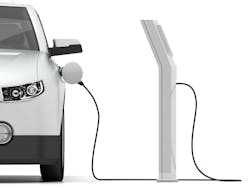China Moves to Stop Crash in Booming Electric-Car Industry
As big as its car market is, China has decided that its 486 aspiring electric-vehicle companies are too many.
The country is considering rules to raise the barrier to entry for electric-vehicle makers and nurture fewer but more competitive players, according to people familiar with the matter. Particularly, China plans to clamp down on EV startups who farm out their manufacturing, the sources said, asking not to be named as the rules are still being drafted.
After hundreds of startups rushed into the electric-car business in the past decade, the government wants to prevent a crash akin to that of dot-com companies two decades ago. China’s electric-car makers have raised $18 billion since 2011, BloombergNEF estimates, but the market is in its infancy and foreign competition from the likes of Tesla Inc. is intensifying.
The new draft rules supplement regulations that took effect this month and only allow “eligible” companies to outsource production to other automakers. As of now, the regulations don’t spell out what “eligible” means.
According to the planned additions, new-energy vehicle makers that want to tap other companies’ production capacity need to have research-and-development investment in China of at least 4 billion yuan ($580 million) over the past three years, global sales of pure-electric passenger vehicles of at least 15,000 units over the past two years, and paid-in capital of potentially billions of yuan, claimed the sources.
The sources stated that new rules also call for manufacturing contracts to run for at least three years with annual production of at least 50,000 units at one location. Startups will be allowed to sign manufacturing agreements with no more than two automakers.
The regulations are still subject to changes, according to the sources interviewed. The Ministry of Industry and Information Technology, in charge of drafting the new rules, said they are still being revised, without commenting on specifics. As a next step, the ministry will solicit views from the public, stated in an emailed response to questions.
Outsourcing production has been a quick way for young electric-car companies to bring out their models while they plan for their own factories, which can cost hundreds of millions of dollars.
Electric-car maker NIO Inc., which had an initial public offering in the U.S. last year, has tapped Anhui Jianghuai Automobile Group to assemble its vehicles while it plans for a manufacturing facility in Beijing. NIO started accepting orders in late 2017 and had sold 16,461 vehicles as of the end of April.
Xpeng Motors, an electric-SUV maker backed by e-commerce giant Alibaba Group Holding Ltd. and Taiwan’s Foxconn Technology Group, has contracted production to Haima Automobile Group Co. while it constructs its own factory. Xpeng has handed over about 4,700 vehicles since starting deliveries in December.
A large portion of China’s electric-car startups have yet to introduce their first commercial product. Total sales in China, the world’s largest electric-car market, topped 1 million for the first time last year.
About the Author
Bloomberg
Licensed content from Bloomberg, copyright 2016.
